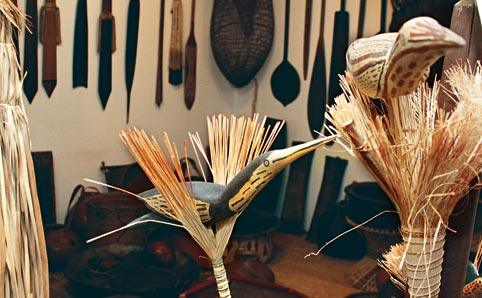
You don’t need to go to the Amazon to find a wealth of magnificent masks, baskets and anteater-shaped stools, made by one of Brazil’s 230 indigenous groups. São Paulo is host to a small, but select, group of shops selling indigenous artefacts, although it’s worth taking a moment to consider what you’re buying before you hit the shops.
All over the city you’ll see shops and markets selling artesanato – local arts and crafts such as lace and brightly painted wooden fruits, produced on a small scale by local communities. More often than not, these objects are ‘made for tourists’, with low quality craftsmanship, using industrialised raw materials such as string and commercial paint. Whilst some of this cheaper artesanato may also be produced by indigenous groups, if you know where to look there’s also a wealth of quality authentic indigenous artefacts to be found in São Paulo, made using techniques and materials that haven’t changed in generations.
Sadly, when it comes to finding out about the origin and authenticity of an indigenous object, things are by no means black and white. Our research could uncover no evidence of an official certification or monitoring system, and FUNAI (Fundação Nacional do Índio) was unable to tell us anything to the contrary.
So we asked around instead, and then hit the streets to check out three shops widely considered to be reputable, whose owners source everything directly from the tribes, and who are passionate about the products – and about the people who make them.
Amoa Konoya
Meaning ‘land turtle’ in the Suruí and Ashaninka dialects, Amoa Konoya is the name given by Walter Gomes and his wife Silvana to their shop which houses the work of more than 60 tribes from across Brazil. If you speak Portuguese, take time to relax in the garden and listen to the stories told by Mr and Mrs Gomes about the tribes and their customs. ‘Every bit of decoration on an object is related to the tribe’s mythology. Think about that next time you sit on a bench decorated with monkeys,’ chortles Mr Gomes, referring to the penchant of some tribes for eating monkey meat as a natural form of Viagra. Rua João Moura 1002, Pinheiros (3061 0639, amoakonoya.com.br). Read more on Amoa Konoya
BEST BUY A ceramic horn made by the Marubo indigenous group in the Vale do Javari. R$380.
Casa do Amazonas
You may be surprised to find Japanese descendants, sisters Fatima and Moriko Hamakawa – their sister Junko sadly passed away in December – running the oldest and most traditional of indigenous shops in the city. Casa do Amazonas has been selling authentic artefacts for more than 30 years, mainly to collectors and foreigners. ‘We’re very careful not to sell objects made for tourists,’ says Fatima who, through her contact with the indigenous communities, is aware of the challenges they face – ‘The use of feathers was banned six years ago, and with that the nature of their work has changed. Deforestation and globalisation have led to a loss of pureness as well.’ Alameda dos Jurupis 460, Moema (5051 3098). Read more on Casa do Amazonas
BEST BUY Ceramic dolls, made for children, by the Karajá tribe, in Tocantins. R$15-$20.
Iandé Not far from Amoa Konoya, tucked in amongst the hustle and bustle of Rua Augusta, is Helena Shizue Yamanaka’s store, Iandé, meaning ‘ours’ in Tupi-Guarani. Before opening the shop in 2000, Helena developed her passion for and knowledge of indigenous objects whilst working at FUNAI. Iandé sells artefacts from more than eighty tribes, including basketry, hammocks, pottery, masks, stools, musical instruments and ornaments, amongst others. All the products come with a useful descriptive booklet that includes the history of the tribe, as well as information about the object. Rua Augusta 1371, Unit 14, Jardim Paulista (3283 4924, iande.art.br). Read more on Iandé
BEST BUY These ceremonial flutes, made by the Waurá group are rare, and cost R$2,550. But don’t panic – there are Guarani flutes from R$25.



